How to Survive a Hostel Kitchen With OCD in 9 Easy Steps
You have done it! You have found a beautiful hostel.
It is safe and clean and has just the right amount of life – not too much that you get no sleep, but not so little that you feel bored. It is just close enough to the big-ticket items of the area that you can walk but far enough out that you aren’t paying a ‘tourist tariff.’ And the beds are comfortable with no little surprises.
*cough* bedbugs *cough*
But then you have to cook your dinner; no matter where you are or how wonderful the place is, hostel kitchens are grim. They might be perfectly clean, but there is always something about a hostel kitchen that you just don’t trust.
Maybe it is the sheer number of people that have used the equipment, maybe it is that you know there is always someone who doesn’t clean up after themselves, and let’s face it, pretty much no one will ever clean to your standard. Or maybe it is because you have seen the state of the communal sponges, which are almost certainly spreading more germs than they are cleaning.
Whatever the reason, it doesn’t really matter. You still need to cook in there.
As someone with OCD, I find hostel kitchens to be one of the hardest parts of travel. At home, my house and kitchen might be a little messy (I can deal with a mess), but I know it is clean. And it is cleaned my way, in the same order, to the same, slightly over-the-top, standard.
So, I have created my own set of steps to survive the ordeal of cooking in a hostel kitchen wherever I am in the world.
SHORT ON TIME? SAVE THIS POST FOR LATER!
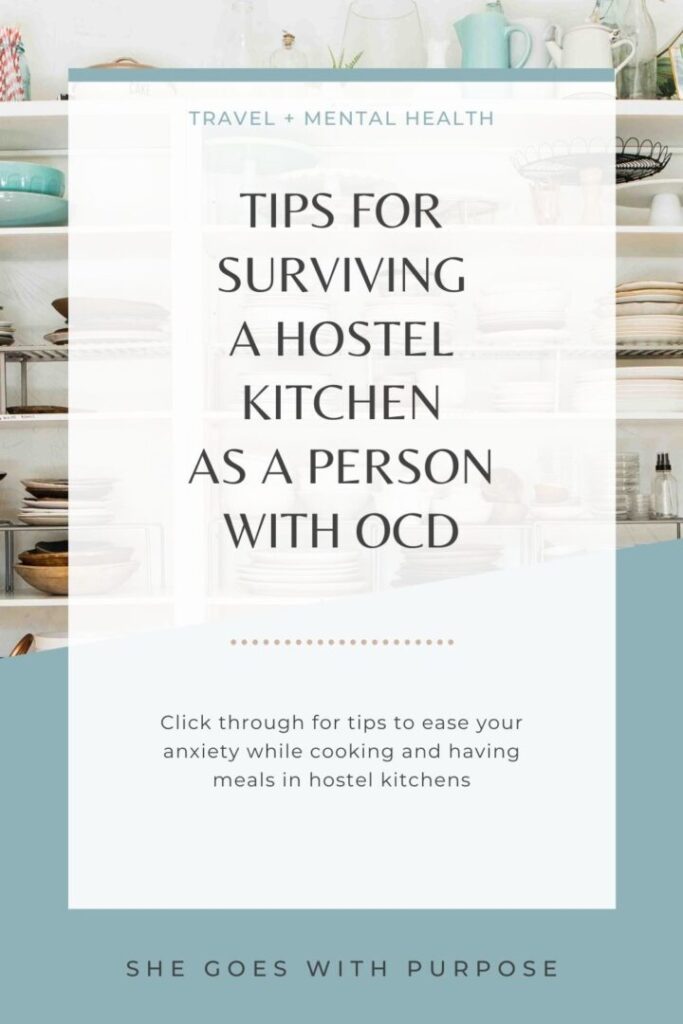
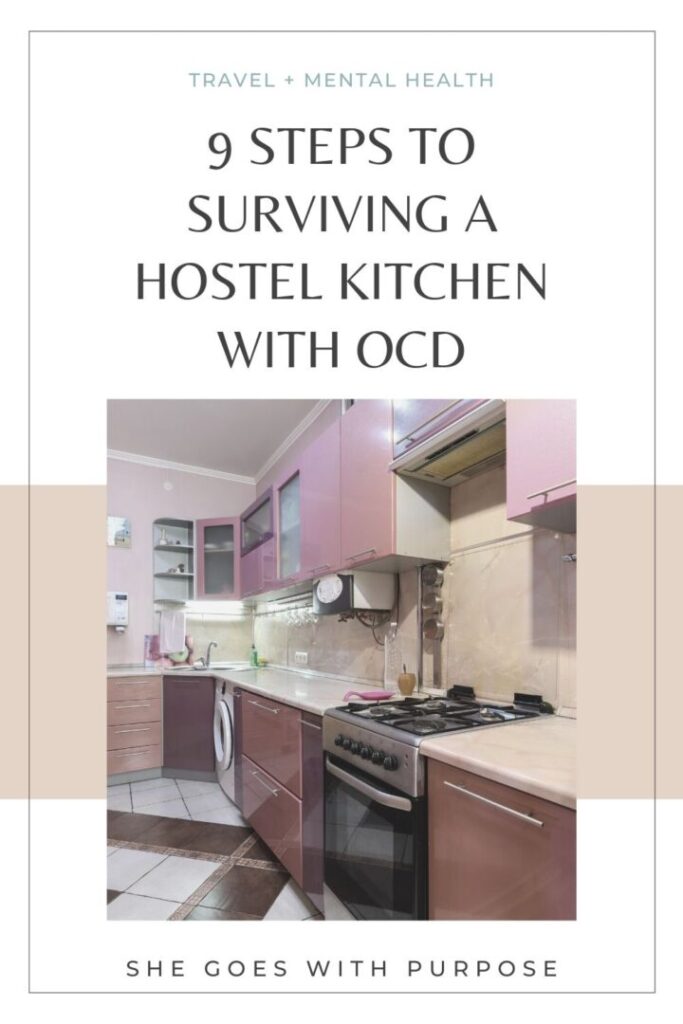
9 Steps to Surviving a Hostel Kitchen as a Person With OCD
Step 1: Clean Your Cooking Area Before You Start
Start with a fresh, clean canvas. Claim your area and prep it as you would at home; all work surfaces inside the sink, taps, and handles that you need to touch should be thoroughly scrubbed. I love to use disinfecting cleaning wipes.
Alternatively, avoid using surfaces at all. For instance, use a cutting board as your work surface for all prep, but first, make sure you clean it!
If you don’t have room in your bag for disinfecting wipes (or would prefer to make less trash), all is not lost.
Step 2: Clean All Equipment Thoroughly
Empty and then boil water in the kettle or a pan. I know I shouldn’t encourage wasting water, but you have no idea how long it has been in there or what it was last used for. Just saying.
Use boiling water to sterilize all the hostel kitchen equipment you will use. Boiling kills germs and also helps to remove any stubborn grime – just make sure you don’t use hostel sponges to clean it! Keep reading for more on this.
*I shouldn’t have to, but disclaimer: boiling water is hot and will scald you, so please don’t just shove your hands in it to do the washing up.
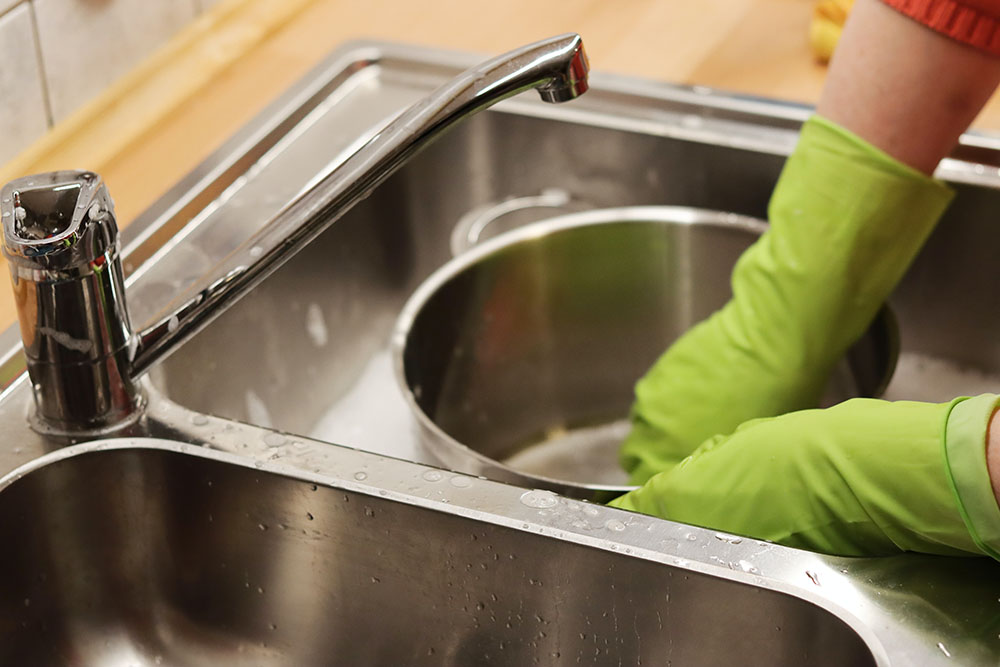
Step 3: Use Your Own Soap
I recommend not using hostel soap because the bottle is usually re-filled and diluted. Plus, chances are the bottle was handled by many dirty hands, so picking it up will spread germs to you.
Instead, I carry a bottle of all-in-one soap like Campsuds or Dr. Bronner’s. It is apparently useful for cleaning dishes, clothes, and even your hair and body, so it is an all-around useful bottle of soap. If you can’t find that, then antibacterial dish soap from any store will work!
Step 4: Don’t Even Think of Touching a Hostel Sponge
Your best friend in this situation is a silicone sponge. I cannot recommend this enough! I carry one in my backpack, which means I do not have to use any hostel sponges.
Since it is silicone, it doesn’t soak up water and won’t harbor germs or make your backpack soggy. Provided you clean it thoroughly with boiling water and soap, it will last indefinitely and keep germs at bay. It does feel a little weird to clean with – it definitely doesn’t feel like cleaning with a normal sponge – but you get used to it pretty quickly.
Step 5: Hostel Towels Should Not Be Trusted Either
Kitchen towels in hostels come in ‘dirty,’ ‘stained,’ ‘very stained,’ and ‘burnt and stained’ varieties. They may be washed regularly (I’ve even seen one hostel wash them daily), but people in hostels seem unable to use them without covering them in pasta sauce. They will never reach my cleanliness standards.
Consequently, I carry my own microfiber cleaning cloth like the small one in this travel towel set. It works brilliantly as a drying towel and dries out in minutes. It is only 15×15 inches, so it uses very little space in my pack, and I don’t begrudge carrying it. I just throw it in the wash whenever I wash my clothes, so I know it is being kept generally clean.
My little travel towel also doubles up as an oven-mitt when folded 2-3 times because, as you can probably guess, I ain’t gonna be using any hostel oven mitts!
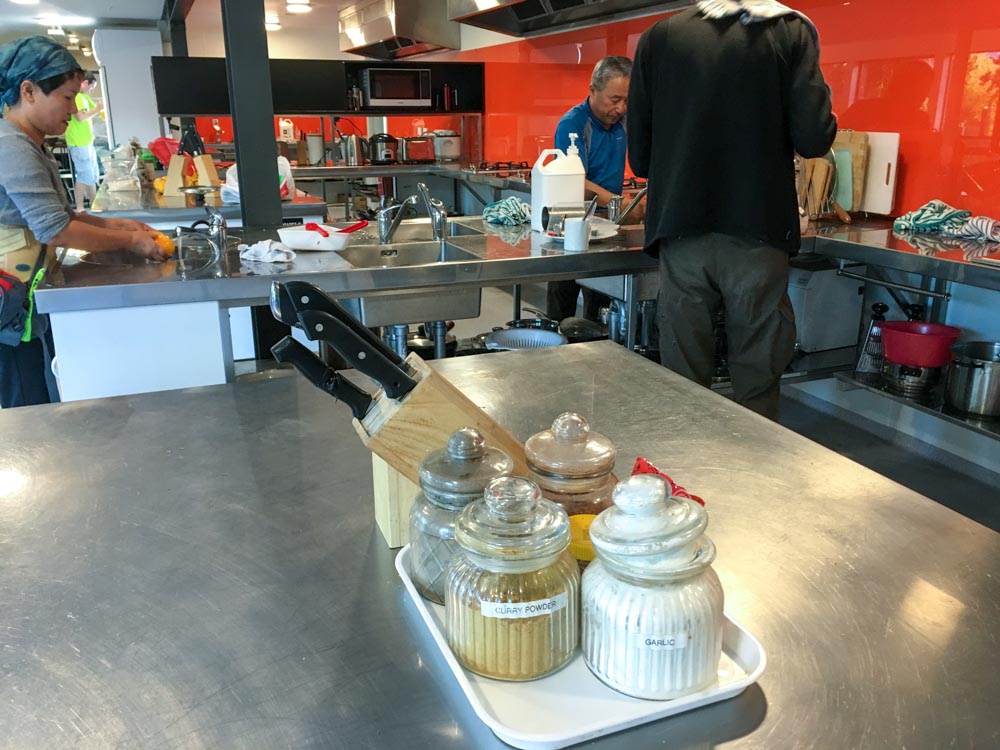
Step 6: Avoid Using the Fridge
Like, don’t even open the door.
The refrigerator is a wonderful invention. Sadly, they are rarely cleaned at hostels. Things get spilled, they might have a cursory wipe-over, but they aren’t clean. Meat is left on shelves (yes, I’ve seen meat left, without any packaging, on shelves in communal fridges). Veggies go soggy and then mushy, and when they smell bad enough, someone clears them out – but they never clean out the gooey vegetable juice that collects in the corner of the crisper drawers.
But even worse, the door handle probably hasn’t been cleaned since the fridge was first installed. Meaning it is one of the grubbiest places in the entire building. I always try to buy food that I can either store without refrigeration, or if I want meat, I will purchase it just before cooking it, so I have no need to use the fridge.
Step 7: Only Use the Stove Top to Cook
It’s not likely to be clean, but neither is the oven nor the microwave. So, the stovetop is your best bet.
Before you cook on the stovetop, clean with your trusty disinfecting wipes first. If the stovetop is hot, you should at least be able to clean any knobs you need to touch. In reality, though, the bottom of the pot/pan is the only thing that will touch the ring, so as long as the pan is clean, it is ok.
I try to avoid using the oven because no one likes cleaning an oven, so it probably hasn’t been cleaned in months, if not years. And I avoid the microwave because it is simply used far too often and improperly. Food spits as it cooks, and no one ever seems to clean it out after, so there is food (potentially going moldy) on the ceiling of the microwave that can drop into your dish at any moment. So, no. No microwave for me!
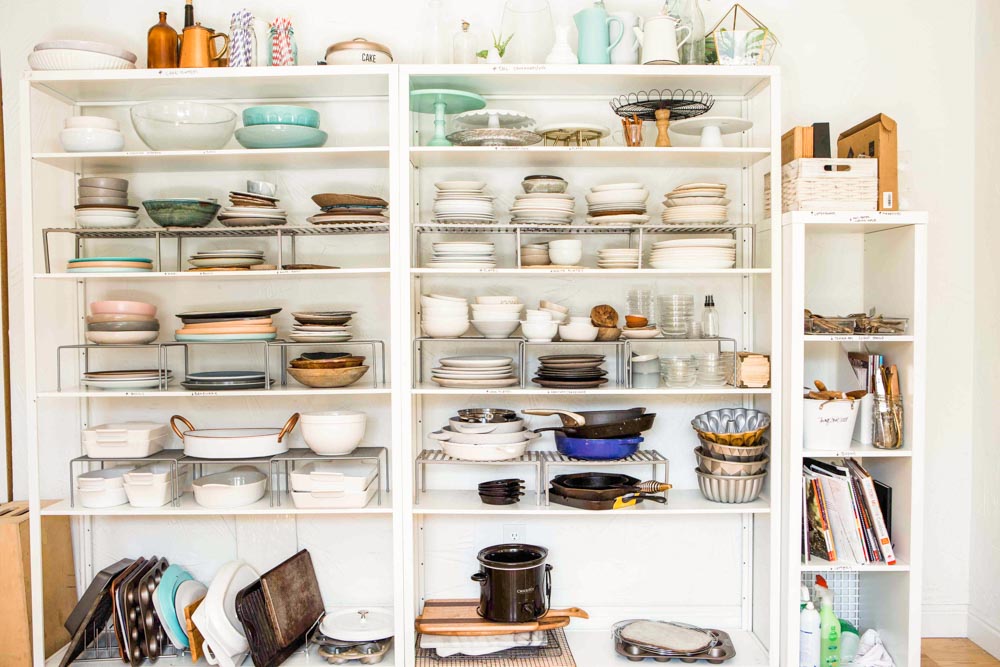
Step 8: Carry Your Own Plate and Utensils
I don’t trust hostel crockery (I know, shocking, right?), so try to avoid it where I can. You probably won’t have enough space to carry an actual plate in your backpack – I only do when I am traveling in my campervan. However, when I’m backpacking, I carry a large plastic mug with a lid (like Tupperware) that I can fill with meals.
My giant mug can be used for eating from – I’ve eaten many pasta and rice meals out of it. Plus, things like bangers and mash or even an omelet. It can also be used for soups and, of course, for drinks.
Along with that, I carry this Sea to Summit spork with a knife. It took me a long time to find a practical one – most sporks with knives have the knife part on the same side as the fork, which is highly impractical as every time you take a bite of food, you cut your lip. This one has the spork at one end and the knife at the other. It means you hold your cutlery further down the handle, but you don’t cut your mouth! However, the most important part of this is because it is my equipment; I know where it has been and who has been using it to eat (literally just me).
Step 9: Clean Up After Yourself
You are a kind and courteous person, so don’t leave anything unwashed. Even if you go through the whole ritual of cleaning the same pans again that haven’t been used in between, still wash up. And wash up quickly. Hostel kitchens are often busy, and there are relatively few pieces of equipment to go around.
So, don’t leave your things to soak in the sink whilst you enjoy a leisurely meal. Clean up before you eat. This has the added bonus of making you clean up quickly so your food doesn’t get cold.
Is All of This Over the Top?
Perhaps for most people, but I have OCD, and I need to do this, or I won’t physically be able to eat. I am fully aware that my OCD affects the lengths I go to for a clean kitchen environment, but I want to show that even with a mental illness, you can travel.
Even if it means you need to take a few extra steps to feel more comfortable.
About the Author
Suzie is a history nerd and mental health advocate from England. At home in the UK, Suzie is a private tutor and her love of learning influences all her travels and writing. You are most likely to find her in a museum or wandering around admiring nature and architecture. Suzie specializes in overland travel; especially train, bike, and campervan journeys. She likes to pretend that she enjoys hiking (she doesn’t, and will give a running commentary of how much she doesn’t enjoy it whenever she goes), but continues to set herself travel challenges regardless of how ridiculous they seem.
Also by Suzie: Overcoming Panic Attacks to Travel the World | A Personal Essay
Follow her (and her husband) on Travelling Sam and on Instagram @travellingsamofficial.
My Health & Wellness Resources page contains helpful sites, phone numbers, and information for anyone needing mental health + wellness assistance.
SAVE THIS POST FOR LATER!
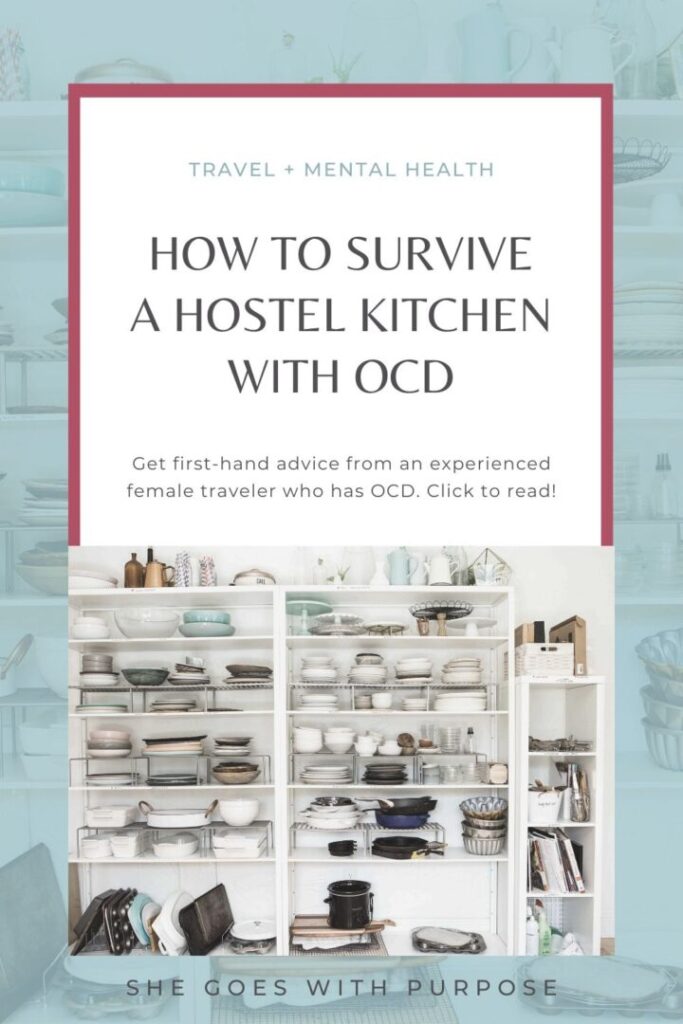
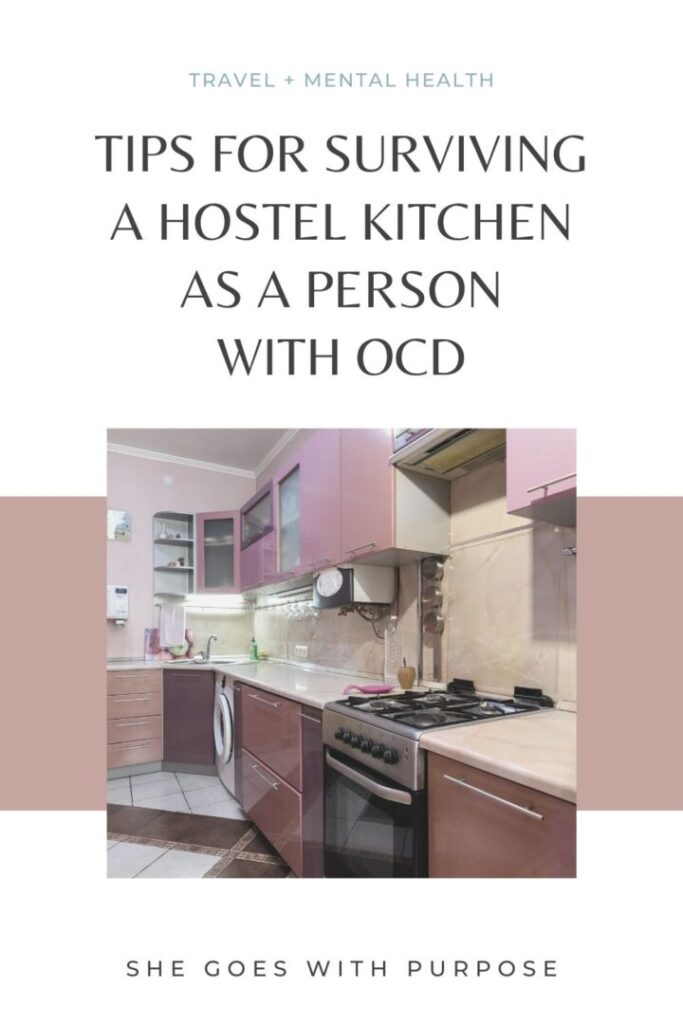
- Like
- X
- Digg
- Del
- Tumblr
- VKontakte
- Buffer
- Love This
- Odnoklassniki
- Meneame
- Blogger
- Amazon
- Yahoo Mail
- Gmail
- AOL
- Newsvine
- HackerNews
- Evernote
- MySpace
- Mail.ru
- Viadeo
- Line
- Comments
- Yummly
- SMS
- Viber
- Telegram
- Subscribe
- Skype
- Facebook Messenger
- Kakao
- LiveJournal
- Yammer
- Edgar
- Fintel
- Mix
- Instapaper
- Copy Link



